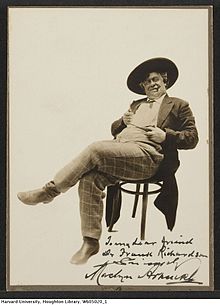
Anne Hartley Gilbert professionally billed as Mrs. G. H. Gilbert was a British actress.
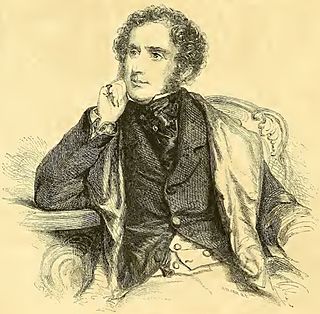
James William Wallack, commonly referred to as J. W. Wallack, was an Anglo-American actor and manager, born in London, and brother of Henry John Wallack.

George Ade was an American writer, syndicated newspaper columnist, and playwright who gained national notoriety at the turn of the 20th century with his "Stories of the Streets and of the Town", a column that used street language and slang to describe daily life in Chicago, and a column of his fables in slang, which were humorous stories that featured vernacular speech and the liberal use of capitalization in his characters' dialog.

Ah, Wilderness! is a comedy by American playwright Eugene O'Neill that premiered on Broadway at the Guild Theatre on October 2, 1933. It differs from a typical O'Neill play in its happy ending for the central character, and depiction of a happy family in turn of the century America. It is O'Neill's only well-known comedy.

Dorothy Heyward was an American playwright.
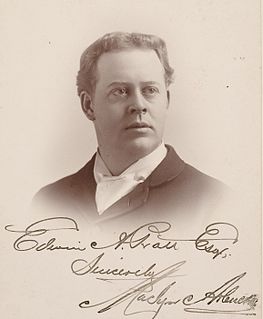
Maclyn Arbuckle was an American screen and stage actor. He was the brother of actor Andrew Arbuckle and cousin of comedian Roscoe "Fatty" Arbuckle.

Four New York City theaters have borne the name Wallack's Theatre. Each has had other names before or after, or both. All are demolished.
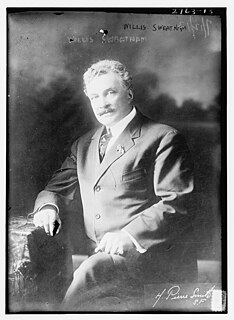
Willis Palmer Sweatnam, Sr. was a Broadway show actor and minstrel show performer.
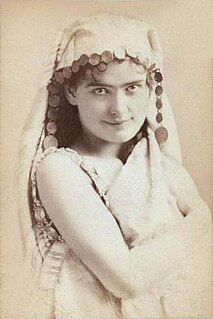
Mary Jeffreys Lewis known professionally as Jeffreys Lewis was a British-born American actress whose career lasted long after her popularity as a leading lady had faded.
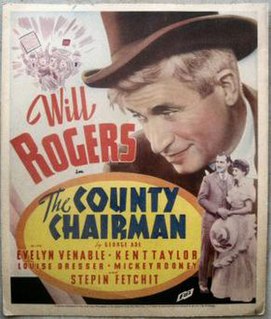
The County Chairman is a 1935 American comedy film directed by John G. Blystone and starring Will Rogers, Evelyn Venable and Kent Taylor. It was produced and distributed by the Fox Film Corporation. It is based on the 1903 play of the same name by George Ade which had previously been adapted into a 1914 silent film The County Chairman.
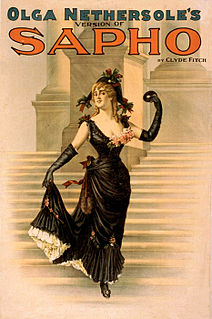
Sapho was a 1900 American play by Clyde Fitch, based on an 1884 French novel of the same name by Alphonse Daudet and an 1885 play by Daudet and Adolphe Belot. It was at the center of a sensational New York City indecency trial involving the play's star and producer/director, Olga Nethersole. The play was not an exceptional success but the incident is considered a notable step in the transformation of American society's attitudes regarding gender roles and public depictions of sex in the 20th century.
The Garden Theatre was a major theatre on Madison Avenue and 27th Street in New York City, New York. The theatre opened on September 27, 1890, and closed in 1925. Part of the second Madison Square Garden complex, the theatre presented Broadway plays for two decades and then, as high-end theatres moved uptown to the Times Square area, became a facility for German and Yiddish theatre, motion pictures, lectures, and meetings of trade and political groups.

The County Chairman is a lost 1914 silent film drama directed by Allan Dwan, produced by the Famous Players Film Company and distributed through Paramount Pictures. It is based on the 1903 stage play by George Ade that starred Maclyn Arbuckle, who reprises his role in this film. Also starring alongside Arbuckle is up-and-coming heartthrob Harold Lockwood. The story is typical of the stage plays Adolph Zukor brought to films for his Famous Players Company in its earliest years. This film was remade by Fox in 1935 with Will Rogers.
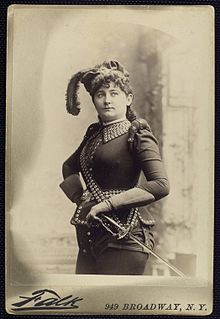
Rose Beaudet was an American actress and opera singer of the late 19th and early 20th century who regularly appeared in musical theatre.
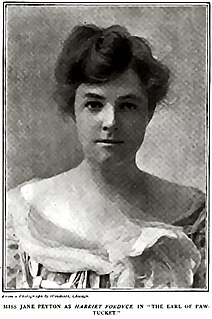
Jane Peyton was an American lead and supporting actress whose career did not commence until she was nearly 30. During her time on stage, she appeared in several long-running Broadway plays and successful road tours. Peyton was perhaps best remembered for performances in The Ninety and Nine, The Earl of Pawtucket, The Heir to the Hoorah, The Three of Us, and The Woman. Once the wife of actor Guy Bates Post, Peyton retired after 14 years on stage, when she married the writer Samuel Hopkins Adams.
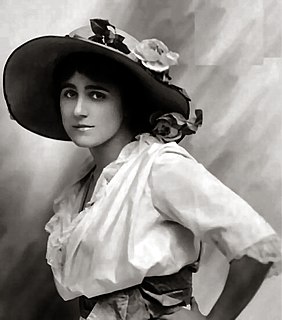
Ivy Troutman was an American supporting actress active during the first half of the twentieth century. She acted in at least twenty-one Broadway productions between 1902 and 1945, appearing in such long-running plays as A Pair of Sixes, Baby Mine and The Late George Apley. In the 1920s Troutman, with her husband, portrait painter Waldo Peirce, joined the colony of American expatriates in Paris that included Gertrude Stein, F. Scott Fitzgerald, Zelda Fitzgerald and Ernest Hemingway.

Wedding Bells is a 1919 comedic play which played on Broadway.

The Broadway Theatre, called the Old Broadway Theatre since its demise, was at 326–30 Broadway, between Pearl and Anthony Streets in Lower Manhattan, New York City. With over 4000 seats, it was the largest theater ever built in New York when it opened. During its brief existence, many prominent performers of the era appeared on its stage. It presented plays, opera, ballet, hippodrama, and circus performances in a space that was reconfigured several times. The operators always struggled to make money, however, and after twelve years the Broadway Theatre was replaced by a more profitable building, for the textile trade.
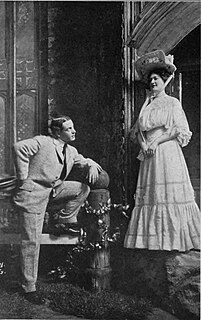
The College Widow is a 1904 American comedic play by George Ade, which was adapted to film multiple times, and also into the popular 1917 musical Leave It to Jane.
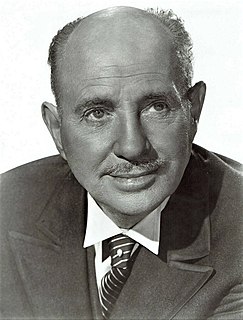
Percy Thomas Carne Waram was a British-born stage and film actor who spent much of his career in the United States. His career lasted 55 years on the American stage, and he had memorable roles in The Shanghai Gesture, Elizabeth the Queen, Mary of Scotland, Pride and Prejudice, and Anne of the Thousand Days. He starred in the Chicago production of Life With Father for three years, setting box office and attendance records, after which he took the production on the road for another 38 weeks. He starred in the Broadway production of The Late George Apley for a year, and then spent another 80 weeks with the show's national tour.
